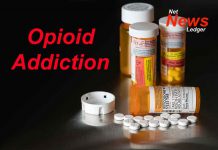
TORONTO – NEWS – Toronto is marking a grim record today. The city is marking a record number of overdoses. Overall, fatal suspected opioid overdose calls to paramedics were 90 per cent higher in 2020 than in 2019, as the opioid poisoning crisis intensified during the COVID-19 pandemic.
Dr. Eileen de Villa, Medical Officer of Health states, “The opioid poisoning crisis has intensified during the COVID-19 pandemic. We continue to lose too many lives to these preventable deaths. Each person is someone’s loved one, friend or colleague. They all deserved the chance and the support to see where else life might have taken them. More and urgent action is needed by all levels of government to address this complex issue. On behalf of Toronto Public Health, I extend sincere condolences to everyone who has lost someone to this crisis.”
This tragic record further proves what we already know: that the COVID-19 pandemic has exacerbated the already deadly overdose crisis in Toronto. In a single month, we have lost 34 friends, community members, and loved ones to the public health emergency that is the opioid epidemic, making it clearer than ever that additional actions must be taken to provide the supports that people who use drugs need, and to save lives in our city,” says Councillor Joe Cressy (Spadina-Fort York), Chair of the Toronto Board of Health.
Toronto Public Health (TPH) released new data highlighting a record number of fatal calls for suspected opioid overdoes attended by Toronto Paramedic Services in December 2020– a total of 34. This represents the worst loss of lives to the opioid crisis recorded in a single month since TPH began monitoring this data in 2017. In addition, between January 1 and 26, 2021, preliminary data indicates that there were 30 fatal calls to paramedics for suspected opioid overdoses.
Toronto Paramedic Services’ data does not capture all deaths due to opioid poisoning, and data from the Office of the Chief Coroner for Ontario shows, on average, double the number of opioid-related deaths than those attended by Toronto paramedics. The Office of the Chief Coroner of Ontario has confirmed 341 opioid toxicity deaths in Toronto from January 1 to September 30, 2020. Preliminary data from the Office of the Chief Coroner for Ontario for all drug-related deaths, including opioids, shows there were 823 deaths in Toronto in 2020, which is 67 per cent higher than the 494 deaths reported in 2019. The amount of 2020 data is likely to increase as more investigations are completed.
Toronto’s unregulated drug supply remains unpredictable and toxic. In 2020, drug checking services in Toronto found unexpected, highly potent drugs in unregulated drug supply samples, including: carfentanil (a highly potent fentanyl analogue), etizolam (a benzodiazepine-related drug), AMB-FUBINACA and ACHMINACA (synthetic cannabinoids), and xylazine (an animal tranquilizer). These drugs increase the risk of overdose and death when combined with opioids. While naloxone has no effect on xylazine, benzodiazepines and related drugs or synthetic cannabinoids, it should still be administered immediately to someone if they are overdosing to reverse the effects of any opioids contributing to the overdose.
TPH remains focused on implementing the Toronto Overdose Action Plan and working with community partners to help address emerging issues related to the opioid poisoning crisis and COVID-19 pandemic. This includes, for example, providing a range of evidence-based harm reduction support at the City’s physical distancing hotels and shelters, including naloxone distribution, harm reduction training and options for overdose response.
TPH is also operating Urgent Public Health Need Sites (UPHNS) as part of the Integrated Prevention and Harm Reduction Initiative (iPHARE), led by Shelter, Support and Housing Administration along with other City departments and community agencies, to help address the opioid poisoning crisis. The Works began operating a UPHNS at the Bond Hotel in early January, and another UPHNS is scheduled to open at the Edward Hotel in February. The UPHNS provide critical lifesaving services for the residents of these physical distancing hotels. Using drugs alone creates the greatest risk for death from overdose. These services ensure that someone is available to provide medical support if a person overdoses, as well as to link them with other health and social services. TPH is also re-opening another injection booth at its supervised consumption service at 277 Victoria St. to enable more people to access this important health service.
All levels of government are needed to effectively respond to the opioid poisoning crisis. The Board of Health continues to advocate for investments in safer supply programs to provide alternatives to the unregulated drug market, along with health and social supports. These actions are urgently needed to save lives and to improve the health and well-being of people who use drugs and the people who care for them.





